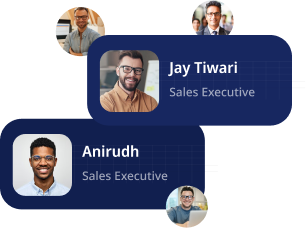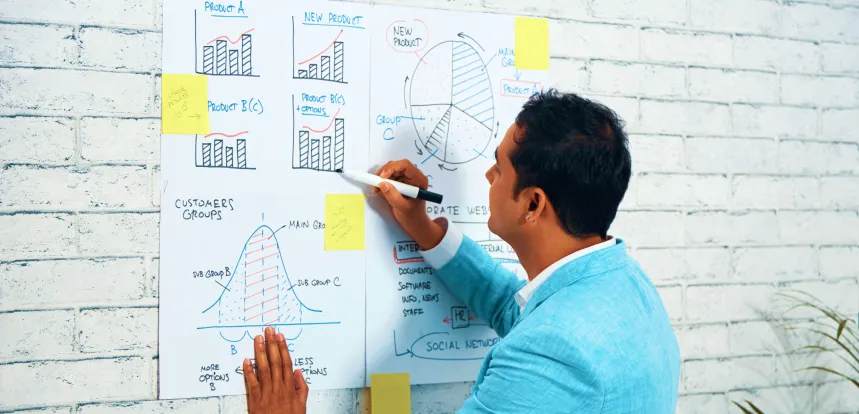750+ MVPs launched | 100% IP Transfer
Turn your product idea into a testable, investor-ready MVP in 8–12 weeks. Our dedicated engineering pods in India help you ship only what matters, and build on an architecture designed for what comes next.
Same-Day Response | Strict NDA, 100% Confidential
Bring your product idea to life through rapid validation, agile execution, and outcome-focused delivery. As one of the top MVP development company in India, we help our partners build investor-ready products, achieve product-market fit faster, and reduce go-to-market risks.
Develop a strategic roadmap for success using our MVP consulting services.
Visualize and refine your concept with our prototype designing services.
Test your MVP in real-world scenarios with our pilot development service.
Get a team focused solely on your MVP project.
Streamline your development process with our end-to-end MVP development services.
Achieve a reliable and robust MVP with our rigorous quality assurance services.
Help convert your MVP into a fully-fledged product for long-term success.
No guesswork - just transparent pricing tiers that give you predictable timelines and deliverables.
Avoid costly reworks with our strategic MVP development that’s focused on real-world testing and feedback.

Different growth stages. Same outcome – predictable speed and validation.
MVP development for startups focusing on validating ideas fast, getting real user traction, and raising confidently.
MVP development strategy to help early growth CTOs hit product milestones without 3-month hiring cycles.
Build and test new ideas under enterprise-grade security and compliance.
At the forefront of MVP development, our expertise bridges innovation with strategic execution. We offer unparalleled guidance and technical proficiency, transforming your ideas into market-ready products.
Our commitment to tailored MVP development solutions, agile methodologies, and meticulous quality ensures we stand out as India’s top choice for MVP development, setting you apart from the competition.
Join a growing list of startup founders who’ve built successful MVPs through our process-driven team.
Partnering with businesses in diverse sectors to unlock new avenues for growth and innovation.
Choose how you want work to move - added hands, owned delivery, or your dedicated engineering hub. Each model is designed to remove friction, speed up progress, and keep accountability clear.
Expand your team. Maintain control
Add engineering capacity without changing how you deliver.
What it is:Billing: Time & Material, Retainer
Best for: Specific skill gaps, capacity crunches
How it works:You interview & select. Scale up/down with 30 days notice.
Request ProfilesCross-Functional Teams That Own Delivery
Dedicated teams accountable for predictable sprint outcomes.
What it is:Billing: Milestone-based, T&M with commitments, or Fixed-Cost
Best for:Products needing speed, cross-team coordination
How it works:We own sprint delivery metrics. Weekly demos.
Get a Pod ProposalYour Dedicated Engineering excellence Hub
Build your secure, scalable engineering hub, operated by us, owned by you.
What it is:Billing: Long-term retainer, BOT (Build–Operate–Transfer)
Best for:Enterprises needing sustained large-scale capacity, cost optimization
How it works:Multi-year partnerships. BOT (Build–Operate–Transfer) options.
Book a Consultation
Minimum Viable Product (MVP) development focuses on creating a simplified version of a product with just enough features to satisfy early adopters and provide valuable feedback for future iterations.
The core idea is to test the product idea quickly and cost-effectively, minimizing risks and validating assumptions before investing in full-scale development.
By launching an MVP, businesses can gather real user insights, refine their product based on actual usage, and ensure that the final product meets market demands and user needs.
Developing a Minimum Viable Product (MVP) offers numerous advantages to businesses, helping them navigate the challenges of bringing a new product to market. Here are some key benefits:
1. Validates Your Idea: An MVP allows businesses to test their core ideas and assumptions in a real-world setting. By releasing a basic version of the product, companies can determine if their concept resonates with the target audience, reducing the risk of investing in a full-scale product that might not meet market demands.
2. Cost-Effectiveness: By focusing on essential features, MVP development significantly reduces costs compared to building a fully-featured product from the start. This approach allows businesses to allocate resources more efficiently, minimizing financial risk while maximizing potential return on investment.
3. Get Early Feedback: Launching an MVP enables businesses to gather user feedback early in the development process. This feedback is invaluable for making informed decisions about which features to enhance or modify, ensuring that the final product aligns closely with user expectations and needs.
4. Create a Brand: An MVP helps establish an initial market presence, allowing businesses to build brand awareness and start generating interest in their product. By entering the market early, companies can differentiate themselves and start building a loyal customer base.
5. Market Testing: An MVP serves as a practical tool for testing various market strategies. Businesses can experiment with different marketing approaches, pricing models, and target segments to find the optimal strategy for scaling the product successfully.
6. Faster Time to Market: Developing an MVP significantly speeds up the time to market, allowing businesses to capitalize on opportunities more quickly. This accelerated timeline enables companies to stay ahead of competitors and respond to emerging trends and demands effectively.
7. Quick Idea Monetization: By launching an MVP, businesses can start generating revenue sooner. Even with a basic version, companies can monetize their ideas and use the initial earnings to fund further development and improvements, ensuring a sustainable growth trajectory.
8. Access to Advanced Technologies: MVP encourages the use of cutting-edge technologies and frameworks that facilitate rapid prototyping and agile MVP development. By utilizing these technologies, businesses can create a competitive product with advanced features and functionalities.
9. Stay Agile: The MVP approach promotes an agile mindset, allowing businesses to remain flexible and responsive to market changes. Continuous iteration based on user feedback and market insights ensures that the product evolves effectively, staying relevant and competitive in the long term.
By embracing the MVP methodology, businesses can mitigate risks, enhance resources, and build a product that truly meets the needs of their users, ultimately leading to a successful market entry and growth.

An MVP (Minimum Viable Product) is a version of a product that includes only the core features necessary to satisfy early customers and gather feedback for further development. Here are the key elements of an MVP:

Building a software solution requires proper planning, implementation, and execution. Since software product development is a long process, businesses nowadays opt for MVP to launch their products in less time. MVP helps you learn about and test the business idea, get user feedback, and upgrade the product per the market expectations.
If you have built an MVP, you are already halfway through the battle. The next step is to transform the MVP into a full-fledged product. Here are the steps you need to follow:
To help you build a successful product from MVP, we recommend you check this our blog.

When it comes to developing a product, MVP (Minimum Viable Product), Prototype, and PoC are terms often used interchangeably that might be confusing at times. Here’s a comparison to help you understand these three terms better.
MVP (Minimum Viable Product)
An MVP is a functional version of a product with the essential features needed to address the primary problem or need of the target audience. It is developed to test the product’s viability in the market, gather user feedback, and validate business assumptions. The goal is to iterate and improve the product based on real-world usage and feedback.
Prototype
A prototype is an early model or mock-up of a product, designed to visualize and test specific features, designs, or concepts. It is typically used to explore ideas and gather feedback from stakeholders and users before actual development begins. Prototypes are often non-functional or partially functional and serve as a tool for brainstorming and refining concepts.
PoC (Proof of Concept)
A PoC is a demonstration to verify that certain concepts or theories have the potential for real-world application. It is a small project created to determine whether an idea can be successfully turned into a reality. PoCs are used to test technical feasibility, identify potential issues, and provide a foundation for further development.
Overall, while a prototype and PoC are useful for validating ideas and technical feasibility, an MVP is a functional product designed to test market viability and gather user feedback for further development.
Explore the key differences between MVP, Prototype, and PoC to choose the right approach for your product development. Read our blog MVP vs. Prototype vs. PoC

MVP development comes with its own set of challenges. Avoiding common mistakes can help you achieve better results and ensure the success of your MVP. Here are some common mistakes to avoid in MVP development:
By avoiding these common mistakes, you can streamline your MVP development process and increase the chances of creating a successful and market-ready product.
The following are some of the most common questions businesses are before partnering with our MVP app development company in India. Contact us if your query isn’t answered.
Ans. An MVP (Minimum Viable Product) allows you to validate your idea with real users before committing significant time and capital. By launching with core features first, you reduce risk, accelerate time-to-market, and gather actionable feedback to refine your product strategy based on real demand
Ans. As an experienced MVP development company in India, we cover the complete journey — from product discovery and feasibility validation to UI/UX design, rapid development, testing, and launch. Our structured approach ensures your MVP is market-ready, user-focused, and built for measurable outcomes.
Ans. As a specialized MVP app development company in India, we typically deliver MVPs within 8–12 weeks, depending on scope and complexity. Our agile methodology ensures faster iterations, continuous feedback, and efficient delivery without compromising quality.
Ans. Yes. Through our SaaS MVP development in India expertise, we conduct feasibility assessments, user journey mapping, competitor analysis, and technical architecture planning. This ensures your MVP solves a real problem and is positioned correctly before development starts.
Ans. With our MVP app development services in India, scalability is built into the foundation. We use modular architecture, clean code practices, and future-ready tech stacks so your MVP can evolve seamlessly into a full-scale product without costly rework.
We are grateful for our clients’ trust in us, and we take great pride in delivering quality solutions that exceed their expectations. Here is what some of them have to say about us:

Co-founder, Miracle Choice

Executive Director

Director

Director
Trusted by Startups and Fortune 500 companies
We can handle projects of all complexities.
Startups to Fortune 500, we have worked with all.
Top 1% industry talent to ensure your digital success.



Whether you're building a SaaS product or scaling your engineering team, let’s align your roadmap with structured execution.